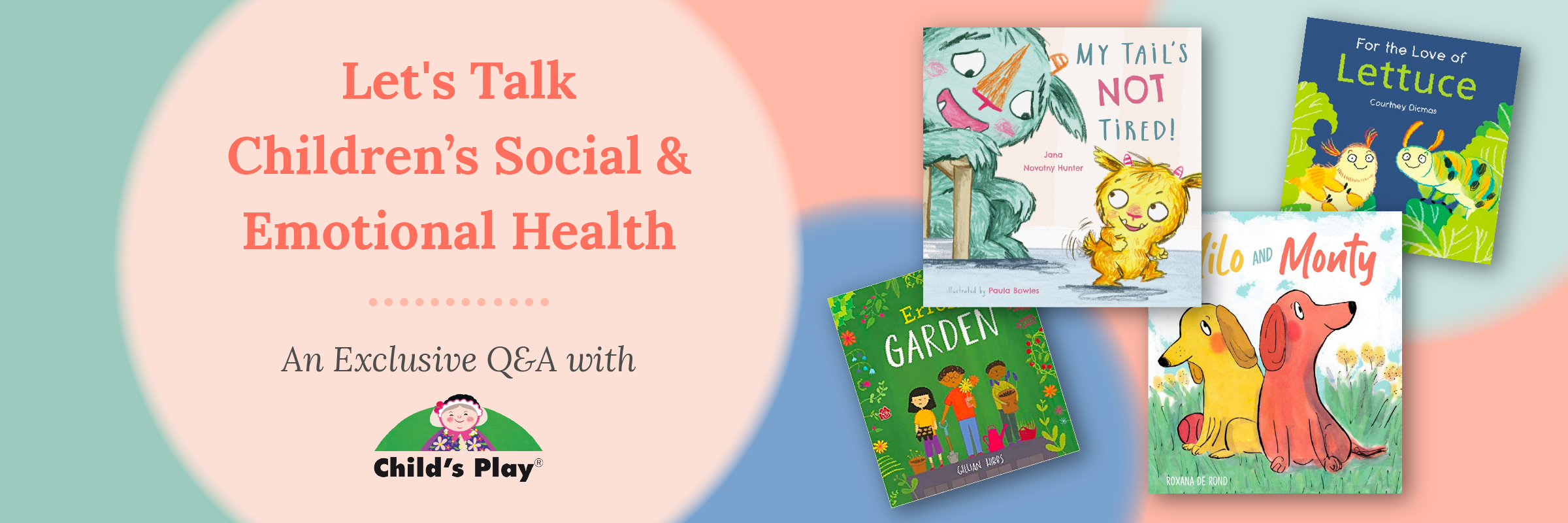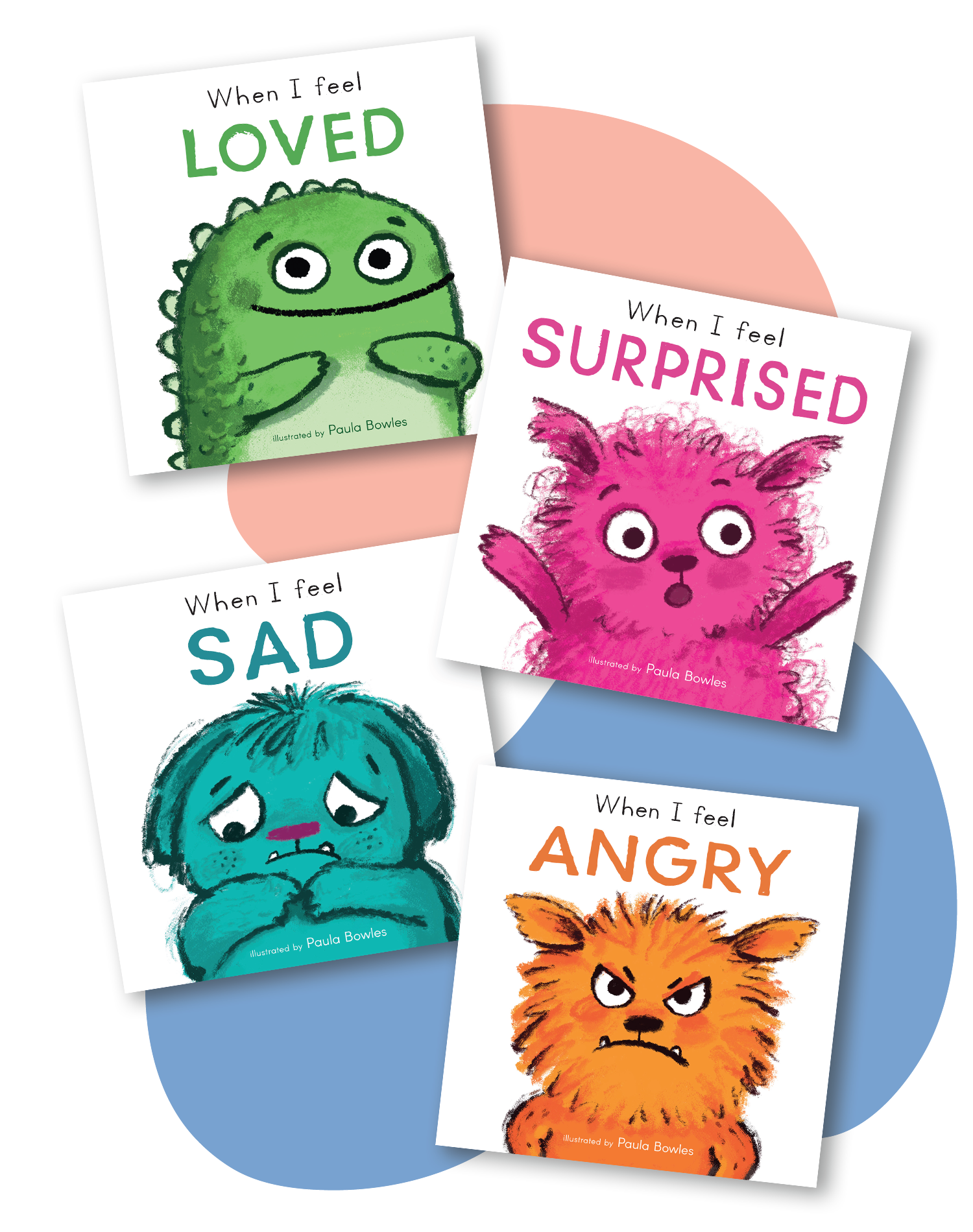
Posted by Sophie Butler on May 25, 2023
Let's Talk Social & Emotional Health with Child's Play

Are you ready to dive into a world of whimsy and wonder? A place where magical creatures roam and adventures are waiting around every corner? Well, hold onto your hats, because today we're talking about the importance of social and emotional health in children's literature!
While many children's books may feature fantastical settings and characters, they also have the unique ability to teach young readers about some of life's most important lessons. The books we read as children can have a big impact on our ability to form positive relationships, manage our emotions, and develop a healthy sense of self.
We got a chance to ask Amy Griffiths, Education Liaison and Marketing Coordinator at Child's Play, some questions about how Child's Play is making an intentional effort to create books centered around social and emotional health for children to teach children about some of these important life lessons.
What is considered a children's book on social and emotional health and how do they differ from other categories of children's books?
Children’s books that typically contain key themes of self-confidence, friendship, self- awareness, and-- depending on the age of the reader--an understanding of community, are usually considered to be about social and emotional health.
Color palettes are carefully selected to match the textual tone of a story, and can be used as talking points. It’s also very important to our team that we include characters with a variety of skin tones. Why? Number one, so that we always reflect diversity. But often, we use color in general to give the reader hints about the main character’s mental state.
Pointing something like this out while reading together can help children develop their observational and analytical skills. Characters in social/emotional stories need to have expressive faces, which helps young children recognize and label emotions. Large eyes can be particularly effective. We used this illustrative device with the characters in our books No! and Milo and Monty, for example.
A strong theme of empathy can usually also be found in these types of books. Empathy is an interpersonal skill that can be developed with practice and understanding. While most children’s books require the reader to understand a character’s emotions and feelings, social and emotional books go a step further and invite the child to reflect on the message of the story more deeply. The hope is that they will learn more about being a good member of society and utilize those skills as they grow up.
In your opinion, why is it important for children to read books on social and emotional health? What key benefits can children gain from these titles?
We’ve listed some of those key benefits above. But another example would be to model healthy social relationships. This can be seen in our upcoming series First Feelings, which will be published later this summer.

These books feature characters that express affection through ways that don’t involve touching. Many books about emotions are limited in scope in terms of how feelings are expressed. We wanted to show young readers that their neurodivergent friends may not like hugs, but might show how much they care by offering up a drawing instead.
Similarly, it was important to us that the series featured non-gender specific characters, because we didn’t want to perpetuate the inaccurate stereotypes that girls are more easily scared or that boys are more likely to experience anger. There’s also a general lack of ungendered characters in both picture and board books, which we’ve tried to address wherever possible. In our book, My Tail's Not Tired! for example, the adult and the child monster are not gendered, which means that the audience can interpret their single-caregiver family in many different ways.
Helping young children understand and develop their own emotional regulation skills is what we strive to achieve. And that means that they’ll be better equipped to understand who they want to become as adults.
Self-esteem and self-confidence can be developed through the rewarding process of learning to read--and being able to talk about and respond to a text. Characters depicted in a variety of scenarios encourage children to see things from other perspectives, and the underlying hope, of course, is that it won’t just be the children who benefit from being exposed to the stories, but society as a whole.
Why did Child’s Play decide to focus on creating books on social and emotional health for children?
Our books have always embodied themes relating to social and emotional health. But over the years, we’ve noticed an increase in studies and programs promoting just how important these early learning skills really are. And it’s made us want to focus more diligently on publishing books that teachers and families can use as resources. The world is becoming increasingly polarized. As such, we need to give children critical thinking skills and the tools to use empathy so as to be able to form their own opinions.
How do you select the topics and themes to include in your books? Are there any trending themes you have been noticing lately?
The topics and themes in the board books we create in-house are usually determined by research. We read numerous articles about early education and listen to what teachers are saying they need. We also work with scientists and organizations to create books that are needed in the marketplace. For example, the First Feelings series mentioned above, was created in consultation with Dr Kathryn Lester, Senior Lecturer in Developmental Psychology at the University of Sussex, in England.
Many of the successful picture book submissions we’ve received lately contain the theme of community. Sometimes opportunities to add more themes to the manuscript emerge during the editing process, so we are also constantly looking for ways to include underrepresented experiences and/or characters in our books.
The idea of personal development has been a recent trending theme on our list. Picture books like Choices and For the Love of Lettuce show that individuals can make positive decisions that will affect their next steps. Another common theme is taking social action. Examples of this can be found in The Can Caravan, Valentine's Guest House and Errol's Garden. The characters in these books work hard to make buildings and activities accessible for other members in their communities.

Can you share an example of one of your titles that you have seen make a positive impact on your young readers?
Sure! Grandma by Jessica Shepherd, now a backlist title, received a great response. In addition to some very positive reviews, several readers wrote to us, describing how the story had helped them explain dementia to a young family member. Another backlist title that continues to sell is Rabbityness, by Jo Empson. This is a moving story about loss that has often been shared at memorial services.
What role can parents and educators play in promoting and incorporating these titles into their childrens’ development?
It’s really important for parents and educators to incorporate these types of stories into a home library or a school classroom. The books may require a bit more preparation or careful thought. But calling out a specific emotion, putting a name to it—and then pausing to talk about how a particular character may feel and why-- can be so helpful in developing interpersonal skills.
What do you see as the future of children's books on social and emotional health? How do you plan to continue contributing to these important titles?
We’re hoping to see more in terms of intersectionality. It’s not uncommon for a person to have multiple marginalized identities and we feel that it’s important for the characters in our stories to reflect this.
What have the results been?
We’ve had terrific results in so many ways. Lots of positive feedback, increased sales, and most importantly, parents and teachers expressing appreciation for our list and asking us to publish more social/emotional content.
We want to thank Child's Play and Amy Griffiths for talking to us about the importance of social and emotional health reflected in children's books. If you want to explore more titles around this subject be sure to check out our social themes children's titles.



